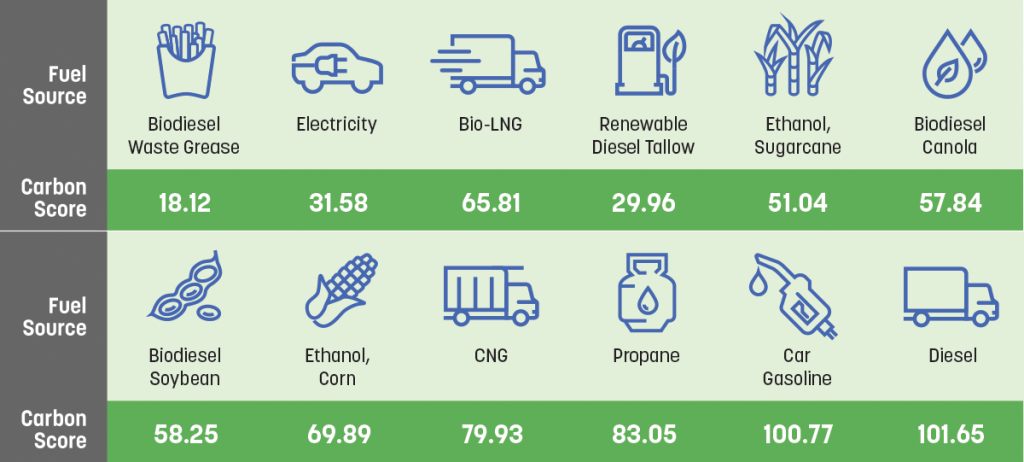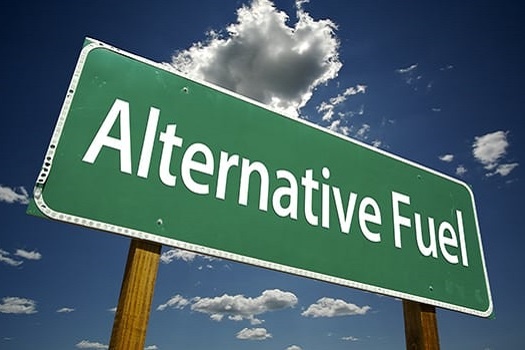The trucking industry is one of the leading sources of greenhouse gases in the United States. The average big rig only gets 7 miles to the gallon, even with the latest technological advances taken into account. As of March 2021, the current administration has enacted changes to the National Highway Traffic Safety Administration’s regulations, aiming to reduce emissions by 2030. The demand and mandate for clean energy fuels grow every day.
Concerns over environmental impact and the rising cost of oil and gas continue to drive interest in clean fuel sources for trucking. But while electric vehicles currently dominate the conversation, electric trucks aren’t the only option for the trucking industry’s future.
There are several types of alternative fuels for trucks currently available, each with its own set of pros and cons. There are also a number of potential clean fuels that could become viable options for the trucking industry in the future.
Here’s an overview of alternative fuels for vehicles that could create a cleaner future for the trucking industry.


Types Of Alternative Fuels In The Trucking Industry:
Ethanol Based Clean Energy Fuels
Ethanol is a renewable fuel source made from plant matter like corn, grains, and sugar cane. This makes it more sustainable than fossil fuels and potentially more environmentally friendly. Ethanol is already widely blended together with gas in the United States. Beginning in 2022, fuel containing up to 15% ethanol will be available at the pump station to combat rising gas prices.
However, ethanol has a smaller energy output than gasoline. This alternative fuel source can reduce a vehicle’s mileage by 20 to 30 percent. Some people believe that the environmental impact of ethanol isn’t worth the amount of energy it takes to create it.
Renewable Natural Gas
Renewable natural gas is a fuel source that has promise as one of the best clean energy sources for trucking. It’s made with captured methane from burning organic matter, like food waste, animal manure, and wastewater sludge. Renewable natural gas is domestically available, making it an appealing option to lessen dependence on imported fuels.
Advocates point out that natural gas can actually remove more carbon from the air than it creates, potentially creating negative greenhouse gas emissions. And unlike many clean fuel sources, renewable natural gas is a “drop-in fuel”. This means that it can run in any vehicle that uses traditional gas without any engine modifications.
However, renewable natural gas is expensive to produce. Also, there isn’t enough of it produced to eclipse our current consumption of gasoline.
Hydrogen Based Clean Energy Fuels
Hydrogen is a potential fuel source that is derived from natural gas. It’s possible to extract Hydrogen from traditional fossil fuels, but it’s also possible to acquire Hydrogen from renewable power sources, like solar and wind power.
Hydrogen is a clean fuel source that has the potential to produce near-zero greenhouse gas emissions. However, like ethanol, hydrogen also has a lower energy output than gasoline. It’s currently not at a competitive price with gasoline.
Biodiesel Based Clean Energy Fuels
Biodiesel itself comes from vegetable and animal fat. Its use includes most diesel-burning engines, or in combination with other diesel fuels. Biodiesel releases fewer greenhouse gases than fossil fuels, making it an intriguing clean fuel alternative for diesel. It’s possible to produce Biodiesel domestically, which could help lower dependence on foreign imports.
However, biodiesel can turn into a thick gel at temperatures below 45 degrees, making it impractical for use in cold weather areas. Biodiesel can also leave behind a residue that can cause potential engine blockages when left unchecked.
Propane Based Clean Energy Fuels
Propane is an alternative fuel source that is a by-product of natural gas and petroleum. It has been around as a fuel source for decades, and many heavy-duty vehicles already run on propane, like school buses. Propane is also reliable in cold weather conditions.
However, propane can’t operate inside a traditional gas or diesel engine. A vehicle either needs to have a dedicated propane fuel system or a bi-fuel system–meaning that it can run on either propane or gasoline. Propane fueling stations aren’t widespread throughout the country either. This creates an obstacle in adapting Propane for mainstream use in the trucking industry.
Electricity As Clean Energy Fuels
No discussion on alternative fuel sources for trucking would be complete without mentioning electricity. Electric energy can come from renewable sources like solar and wind power, and many electric vehicles are more efficient than traditional gas engines. There are already electric freight trucks currently on the market today.
However, trucks with gas or diesel engines can’t run on electric energy, meaning that trucking companies would have to replace their entire fleet. Electric vehicles are usually more expensive than their gas-powered equivalents. But that could change in the future as technology advances and prices for electric vehicles reduce.
Alternative fuels for trucking: Conclusion
While electric vehicles hold promise for the future, there are plenty of potential alternative fuel sources in the trucking industry. Time will tell which options will prevail as the trucking industry gradually shifts away from fossil fuels and into a more eco-conscious existence.
Looking for a New England trucking company?
While no one can tell what the future holds, if you need a transportation company to help you through today, N&D Transportation Company Inc can help.
With over 50 years of trucking experience, we’ve adapted to the ever-changing trucking industry, and we’ll continue to adapt to what’s coming in the future. We can help your business find solutions for all your freight needs both in the Rhode Island area and throughout the country with the help of our partner carriers.
Contact us for information on how our New England trucking company can help your business.



